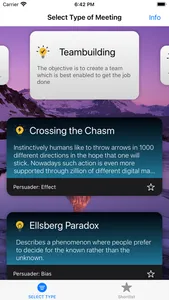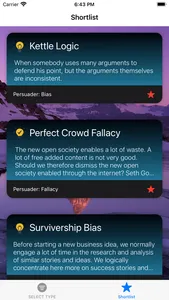Thinking mistakes are defects in our thinking process that weaken our aim to find the best solutions. By learning to recognize common fallacies, biases and effects, we can avoid these mistakes in the context of meetings or decision making. At the same time we can also learn to recognize the thinking mistakes when used by others. The goal of this app is to provide you with a reliable tool, always on hand whenever and wherever needed, to avoid all those thinking traps and make you stronger in your decisions and prepared for your next meetings.
What to expect from this app?
This App helps to avoid thinking mistakes before they occur. The author Lukas Ritzel believes this App helps every decision maker do just that - avoid making mistakes in the first place. It provides you with a mobile collection of commonly known and more recently identified fallacies, biases, and effects and explains them with examples, catchy visuals, and references allowing for deeper research. You can filter results by searching for thinking errors by situation and objective, and can build your own shortlist with your "favorites." And for each of these thinking mistakes, the Apps will suggest management tools which will support you in avoiding those thinking errors.
The fact and story behind development of the management thinking mistakes app
Computer power, when combined with huge amounts of data, transformed the "Art of Management," to that of a "Science of Management."
To make the right decision is more difficult than ever
As we have all painfully experienced in the last few years, models thought to ensure stability in various business sectors did not completely work. Finance, insurance, and economic endeavors failed in spite of sophisticated decision-making models and huge quantities of calculated data. As the recession and failures spread, this experience may have given an impression that all those highly sophisticated models failed. But as always with extremes, it would similarly be wrong to advise all managers to do a 180 degree turn around and make decisions only on the basis of gut instinct.
Sometimes we are all trapped by thinking mistakes
What the author believes is that most of those tools have their place and are useful, but they must be embedded in more realistic modes of human behavior. We are all humans after all, and we sometimes fall into logical fallacies - but to avoid them in our own arguments, and defend ourselves from such fallacies when they are used against us, it is first necessary to recognize them. Companies will continue to seek ways to exploit the increasing amounts of data and computing power available, but managers in every industry must take responsibility for looking inside the black boxes that advanced quantitative tools often represent and understanding their functioning, assumptions, and limitations.
The App is of Swiss origin
What to expect from this app?
This App helps to avoid thinking mistakes before they occur. The author Lukas Ritzel believes this App helps every decision maker do just that - avoid making mistakes in the first place. It provides you with a mobile collection of commonly known and more recently identified fallacies, biases, and effects and explains them with examples, catchy visuals, and references allowing for deeper research. You can filter results by searching for thinking errors by situation and objective, and can build your own shortlist with your "favorites." And for each of these thinking mistakes, the Apps will suggest management tools which will support you in avoiding those thinking errors.
The fact and story behind development of the management thinking mistakes app
Computer power, when combined with huge amounts of data, transformed the "Art of Management," to that of a "Science of Management."
To make the right decision is more difficult than ever
As we have all painfully experienced in the last few years, models thought to ensure stability in various business sectors did not completely work. Finance, insurance, and economic endeavors failed in spite of sophisticated decision-making models and huge quantities of calculated data. As the recession and failures spread, this experience may have given an impression that all those highly sophisticated models failed. But as always with extremes, it would similarly be wrong to advise all managers to do a 180 degree turn around and make decisions only on the basis of gut instinct.
Sometimes we are all trapped by thinking mistakes
What the author believes is that most of those tools have their place and are useful, but they must be embedded in more realistic modes of human behavior. We are all humans after all, and we sometimes fall into logical fallacies - but to avoid them in our own arguments, and defend ourselves from such fallacies when they are used against us, it is first necessary to recognize them. Companies will continue to seek ways to exploit the increasing amounts of data and computing power available, but managers in every industry must take responsibility for looking inside the black boxes that advanced quantitative tools often represent and understanding their functioning, assumptions, and limitations.
The App is of Swiss origin
Show More


